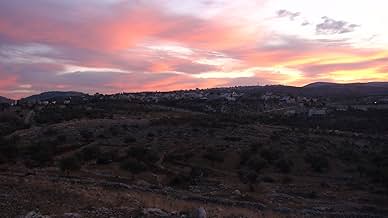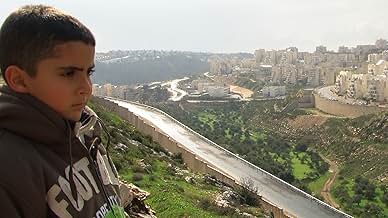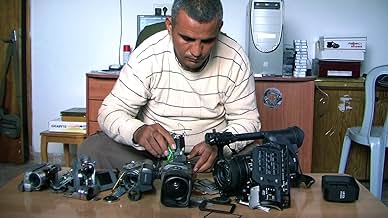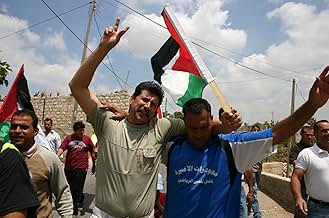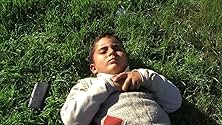Israël élève un mur entre un village Palestinien et une colonie juive, expropriant les fermiers de leurs terres. Les Palestiniens engagent une résistance non-violente pour garder leurs terre... Tout lireIsraël élève un mur entre un village Palestinien et une colonie juive, expropriant les fermiers de leurs terres. Les Palestiniens engagent une résistance non-violente pour garder leurs terres et co-exister pacifiquement avec les IsraéliensIsraël élève un mur entre un village Palestinien et une colonie juive, expropriant les fermiers de leurs terres. Les Palestiniens engagent une résistance non-violente pour garder leurs terres et co-exister pacifiquement avec les Israéliens
- Réalisation
- Scénario
- Casting principal
- Nommé pour 1 Oscar
- 18 victoires et 10 nominations au total
- Self - Protester
- (as Phil)
- Self - Protester
- (as Daba)
Avis à la une
A clear indictment of Israel as a country as well as the crazy people who claim right to the land based on biblical scripture, the olive farmer Emad Burnat films his side of the story. Naturally one can claim bias, but truly the ongoings captured on tape by the cameraman cannot be exonerated or justified, nor do any of the films detractors manage to concoct any compelling counterarguments instead of the non-sensical 'Cry Wolf' tactic. Night raids on a village in order to arrest random children? Claiming land by appropriation? Burning down orchards of peaceful farmers? Shooting at children throwing stones? Army allowing settlers to attack unarmed peaceful protesters? Banning people from building structures on their own land? Widerspread harassment techniques to stop people from protesting? Throwing people out of their own house at night because its now a "Closed Military Zone"? Shooting a captured and restrained man at point blank range in the leg? Total disregard to their own court rulings? A sniper shooting a 11 year old boy in the head? And the best Israeli apologists can come up with is... but but but... they threw rocks.
A firm believer that somewhere along the road only a one-state non-religious democratic solution can avert a brutal war. The Zionists must accept that their inhumane treatment of the Palestinian people will have to end in bloodshed - be it theirs or the genocide of the Palestinian people. Only peaceful reconciliation inspired by the greats like Nelson Mandela can counter this inevitable tragedy. Unfortunately "5 Broken Cameras" leaves little space for hope...
"5 Broken Cameras" has left me mad and riled at the international community in general, which allows an apartheid state committing daily acts of ethnic cleansing through the use of force, appropriation of land and unjust racial policies to be a member of the international community. Despite governing a state that makes South Africa's apartheid look weak and crippled, Israel has yet to have any sanctions hit against it. Even worse - USA persists in funding the same army that is brutally encroaching human rights on a daily basis.
Living in an occupied territory will always be frustrating and, at times, humiliating. However, the major issue that the film follows is the building of huge Israeli "settlements" in the occupied territory. (The "settlements" look like large, fortress-like, apartment complexes.)
Although we have all seen footage of Palestinians throwing rocks, and Israeli soldiers responding with teargas and rubber bullets, Burnat films less dramatic instances of nonviolent resistance by Palestinian villagers. As a participant-observer, Burnat is himself vulnerable. He was seriously injured in one skirmish. The title "Five Broken Cameras" refers to Burnat's own cameras, which were smashed during confrontations with Israeli soldiers. (Some of the cameras were purposely destroyed, while others were hit by rubber bullets.)
Whatever your position is about the Israeli-Palestinian conflict, it's useful to see a film that presents the Palestinian perspective. We saw this movie at Rochester's Little Theatre as part of the excellent Witness Palestine Film Series. It will work better on a large screen, but it's worth seeing on DVD if that's the only option available. Five Broken Cameras was nominated for an Oscar in 2012 as Best Foreign Film.
This is the conflict viewed through the eyes of a Palestinian villager, warts and all and as such does not shy away from recording the trials and tribulations that the cameraman and his village (and subsequently country) are confronted with on a daily basis. The argument that this movie is one sided is somewhat valid, although how anybody could expect anything else is beyond me due to the method utilized in gaining the footage. There is no secret agenda, no propaganda, it is simply the conflict as viewed by somebody who is currently living it.
Regardless of your beliefs, sympathies or country of origin this movie is worth your time for the rare insight, at ground level, that it provides. Whether you agree with either sides position in the conflict is a different debate entirely and should not be included in any kind of review. All I can say is if you are unfamiliar with what is occurring or unaware entirely this film will give you food for thought.
Today, Sunday, February 24, 2013, the Oscars will be hosting this first ever Oscar nominated Palestinian documentary, whose content, we all know full well, will never be shared with the estimated one billion worldwide viewing audience, nor will it ever be permitted to win.
Nevertheless, it just happens to fall on the Jewish Holiday of Purim, which commemorates the deliverance of the Jewish people in ancient Persia, in the wake of a plot by Haman. It is a story recorded in the Biblical Book of Esther. Understandably, this day of deliverance has become a day of Jewish feasting and rejoicing. It is celebrated by the giving of mutual gifts of food and drink, the offering of charity to the poor, the consumption of a celebratory meal, and in addition to the prayers and the grace after the meals, there is often a public recitation of the Scroll of Esther. Other customs include the drinking of wine, the wearing of masks and costumes, as well as the exuberant display of celebrations in public. Like Hanukkah, Purim has more of a 'national' (Israel) than a 'religious' (Judaic) character, and its status as a holiday is on a lesser stature than those days ordained by the Torah. Accordingly, business transactions (including the Oscars), and even manual labor are allowed on Purim.
As early as the 5th century, there was a custom to "BURN AN EFFIGY" of Haman on Purim.
However, the first religious ceremony ordained in the celebration of Purim, is the reading of the Book of Esther (Megillah) in Synagogues. The Megillah is read with a scintillation (a traditional chant) differing from that used in the customary reading of the Torah. When Haman's name is read out during the public chanting of the Megillah in the Synagogues, which by the way occurs 54 times, the congregation engages in boisterous noise-making to "BLOT OUT THE NAME".
Over time, a custom developed of writing the name of Haman on two smooth stones, thereafter knocking them together until the name was blotted out. Others write the name of Haman on the soles of their shoes, and then at the mention of the name, loudly and repeatedly stomp their feet as a sign of contempt. Most though, employ the use a loud and noisy ratchet, called a ra'ashan, or in Yiddish a grager. Although some rabbis have protested against these uproarious excesses (raucous stomping and deafening ratcheting), considering them to be a disturbance of public worship, nevertheless, these two customs in particular, have continued to be universally carried out in almost all Synagogues on Purim.
Just a thought ?!
I wonder if during the Oscars, the Zionists of Hollywood plan to conduct an 'L.A. Festival of Burning', wherein all copies of the "Un-Israeli" film '5 Broken Cameras' will be incinerated, not unlike that conducted by the Nazis in May of 1933, during which upwards of 25,000 volumes of "Un-German" books (predominantly Jewish) were burned ?!
Or worse yet, publicly humiliate themselves during the announcement of the film's nomination for an Oscar award, by stomping their feet and twirling permitted Ra'ashans, in a feeble attempt to 'Blot It Out'?!
After all, just the other day, they did attempt to prevent the film-maker Emad Burnat, together with his wife and 8 year old son, from attending, by way of harassment and intimidation at the hands of Immigration Officials at L.A.X.
Perhaps, it was because a 'Film' or even a 'Broken Camera' in the hands of a Palestinian now constitutes a potential 'Terrorist Threat' ?!
Le saviez-vous
- AnecdotesEmad Burnat is the first Palestinian nominated for the Academy Award for Best Documentary Feature.
- Citations
Emad Burnat - Narrator: Healing is a challenge in life. It's a victim sole obligation. By healing, you resist oppression. But when I'm hurt over and over again, I forget the wounds that rule my life. Forgotten wounds can't be healed. So I film to heal. I know they may knock at my door at any moment. But I'll just keep filming. It helps me confront life. And survive.
- ConnexionsEdited into P.O.V.: 5 Broken Cameras (2013)
- Bandes originalesMusic from the albums: Randana, Majâz, As far
Music composed and performed by Samir Joubran, Wissam Joubran, Adnan Joubran
Interpreted by Le Trio Joubran
Percussions by Yousef Hbeisch
(p) & (c) Randana - 2007
Courtesy of Randana
Meilleurs choix
- How long is 5 Broken Cameras?Alimenté par Alexa
Détails
- Date de sortie
- Pays d’origine
- Sites officiels
- Langues
- Aussi connu sous le nom de
- Cinq caméras brisées
- Lieux de tournage
- Sociétés de production
- Voir plus de crédits d'entreprise sur IMDbPro
Box-office
- Montant brut aux États-Unis et au Canada
- 109 983 $US
- Week-end de sortie aux États-Unis et au Canada
- 6 674 $US
- 3 juin 2012
- Montant brut mondial
- 146 475 $US
- Durée1 heure 34 minutes
- Couleur
- Mixage
- Rapport de forme
- 1.78 : 1
Contribuer à cette page



